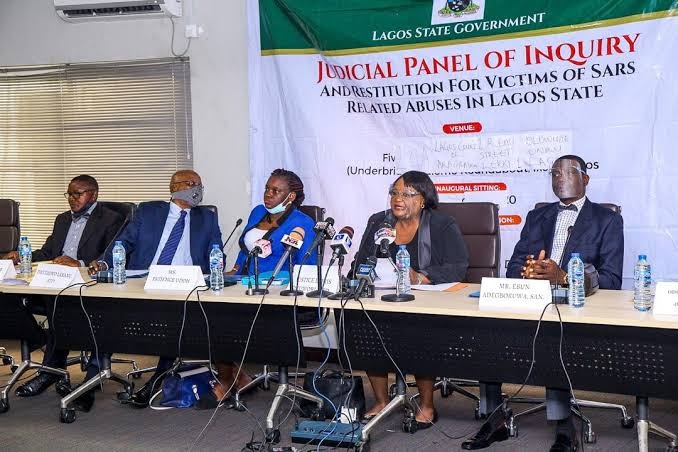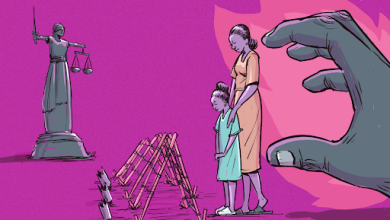#EndSARS: Impact Of Judicial Panels In Facilitating Justice For Victims Of Police Brutalities
“The judicial panel has contributed a fraction in solving reported cases of brutalities within the short time frame of formation.”

Nearly a year after different state governments in Nigeria instituted judicial panels of inquiry into allegations of brutality and extra-judicial killings against the now defunct Special Anti-Robbery Squad (SARS) of the Nigeria Police, some of the victims have been served justice.
Adeoye Akintunde, a firefighter who was wrongly arrested, detained, and tortured by SARS operatives on June 14, 2020 is now shortlisted among those to be compensated by the Government of Ogun State in Southwest Nigeria. Akintunde was illegally arrested at a canteen in Ayetoro while he was having his lunch. It was not the first time.
“Early June, my house was busted by men of SARS. According to my wife, there were six fully armed men. I was on night duty at work as a firefighter. They broke my door to gain entrance, met my wife who was undressed, searched and scattered my house,” he narrated the beginning of his ordeal. All this happened between 2 a.m. and 3 a.m. They left when they did not see me.”
About his own arrest: “they had started beating me at the scene of my arrest. I was bleeding from my mouth and when they took me to the police station, they used an iron rod on me while I was handcuffed,” Akintude told Humangle.
He said the raid on his home was led by an operative identified as Omo Mushin, who alleged that he was a cultist, while threatening to kill the complaint.
“After some minutes, they took me to my house and searched everywhere. After finding nothing implicating, they drove me to Magbon-Abeokuta without telling my wife and daughter. They seized my phone, shoes, ring, and necklace” he recalled.
Illegal torture, pain, and suffering- SARS’ imprints
While in custody, Akintunde said he went through hell and had never experienced such brutality before in his life.
“I was tortured with iron rods and hammers to the extent that I fainted. After I fainted, they invited a nurse to inject me. They appended my thumb print on a statement that I did not write,” he recalled.
“I broke my leg and had scars on my face and body. It was after five days, my family knew my whereabouts.”
After spending 12 days in detention, Akintunde was granted bail at the sum of N300,000 but was released after his family had negotiated to pay N120,000. “I was hospitalised for six days in a private hospital after my release. It was then I discovered I had broken my leg and gotten several health complications which I suffered for months,” he added.
Just like Akintunde, Humangle had reported the story of Abayomi Adebayo, who lost his mother to the sporadic shooting of the SARS operatives in Lagos while searching for an internet fraudster celebrating his birthday.
“They normally come there for their stop and search. We were still talking when I received a call from my mother’s younger sister that SARS had injured her. They took her body to Olosan police station. It was when I entered their police station that I saw my mum’s dead body in their vehicle,” Abayomi told the Lagos State Judicial Panel of Inquiry.
Humangle also reported how Obong Paul Etim Ekpo, 73, was denied access to his hypertensive drugs, while he was unlawfully detained for three days over a land dispute in Akwa-Ibom State.
Setting up a judicial panel of enquiry
As part of response to the five demands raised by the Nigerian youths, during the #EndSARS protest in Oct. 2020, Nigerian Vice President, Yemi Osinbajo, directed all the state governments to set up a judicial panel of enquiry, which would investigate all the allegations of brutality and extrajudicial killing against the SARS squad.
Osinbajo also proposed that the states should set up a victim support fund to compensate for the injustice suffered by victims.
Babajide Sanwo-Olu, Governor of Lagos State, Southwest Nigeria said he had approved a N200 million fund for the panel to compensate victims.
According to data collated by Yiaga Africa, a non-governmental civic organisation, between Oct. 26, 2020 and Feb. 28, 2021 a total of 29 out of 36 states have constituted the judicial panel of enquiry with 2,744 petitions received.
Justice for victims
As the panels rounded up their work, a report has shown that only seven out of the 29 states’ judicial panels have submitted their conclusive reports and recommendations.
Akintunde who had submitted his claim with the Ogun State Judicial Panel of Ogun was listed among the beneficiaries for compensation in the state.
“My name is on the list of those to be compensated but I don’t know why our government has not implemented the panel’s recommendation. I expected it to be an immediate thing when it has to do with health and life,” he said.
“Some have been confined to wheelchairs, while some victims are no more. They should compensate us in time.”
Humangle also reported how 12 victims of police brutalities were awarded a total of N68.25 million in six months by the Lagos State Judicial Panel.
Abayomi Adebayo, whose mother was killed by bullets from SARS operatives, was awarded N10 million as compensation. Also, a sum of N10 million was awarded to the family of the late Kolade Johnson who was killed by Nigeria police officers in 2019.
Kemisola Ogunniyi’s baby, who was delivered while in detention after following the mother’s arrest in Ondo State, Southwest Nigeria was offered a scholarship by Thomas-Wilson Ikubuse, a Nigerian doctor.
‘Panel cannot solve impunity’
Ademola Owolabi, a human rights lawyer, said the judicial panel was set up to douse the situation in the country and not to reform the police system.
“The panel was set up to address the issues, not that the state or government was willing to. I do not think it has been totally impactful because the panel can only make findings known; it takes the government to be willing to effect those recommendations,”Owolabi told HumAngle in an interview.
He emphasised that, while the panel had successfully highlighted issues around the police system, operatives are reportedly still brutaliting people in some states.
Also, Festus Ogun, a human right lawyer, while referencing the Oputa panel set up to investigate human rights abuses during the military rule in Nigeria from 1984 to 1999, stressed that the same fate might befall the End SARS panel.
The Judicial Panel is a panel of enquiry and findings. Legally, it cannot give a verdict. In fact, there are questions being raised as regards the constitutionality of the panels. But, that is an issue for another day, he argued.
“The panels appear to be a calculated strategy by the authorities to give false hope for victims of police gangsterism. My position hinges on the fact that the law places the implementation of the findings of the panel at the discretion of the President who himself has a stained human rights record.”
However, when compared with the judicial system in Nigeria, Owolabi believes that the panel had contributed a fraction in solving reported cases of brutalities within the short time frame of formation.
Support Our Journalism
There are millions of ordinary people affected by conflict in Africa whose stories are missing in the mainstream media. HumAngle is determined to tell those challenging and under-reported stories, hoping that the people impacted by these conflicts will find the safety and security they deserve.
To ensure that we continue to provide public service coverage, we have a small favour to ask you. We want you to be part of our journalistic endeavour by contributing a token to us.
Your donation will further promote a robust, free, and independent media.
Donate HereStay Closer To The Stories That Matter




